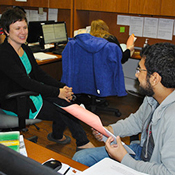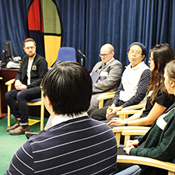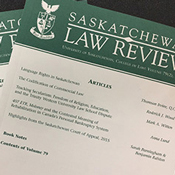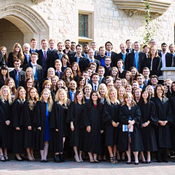About
Our Juris Doctor (J.D.) degree program provides the opportunity to pursue your legal education in a collegial and student-centered environment.
- Three year degree
- Full or part-time program
- You cannot begin this program directly from high school
Program options

While you complete your Juris Doctor degree, you can also enhance your experience with the following options:
The University of Saskatchewan College of Law offers a Certification in common law in French - Certification de common law en français (CCLF), which has been launched through a partnership with the University of Ottawa Faculty of Law.
The CCLF will allow incoming students with competencies in French the unique opportunity to obtain a Certificate in French Common Law from the University of Ottawa during the completion of the three year University of Saskatchewan J.D. program.
This joint program is the first of its kind in Canada, and will allow selected students the opportunity to gain valuable skills in French legal writing and advocacy as well as a deep understanding of the important issues surrounding language rights in Canada.
Selected students will complete an exchange in Ottawa, compete in a moot court competition with teams throughout Canada, be paired with experienced mentors in the legal profession, and have the opportunity to complete a credited internship with law firms, organizations and government actors that work in French.
These unique experiences will give participating students the necessary tools to offer legal services in French upon graduation. The CCLF is a first step towards a varied and rewarding career, including:
- opening doors to prestigious clerkships with the Supreme Court of Canada, the federal courts and the federal public service;
- accessing legal careers where legal training and proficiency in both official languages is an asset;
- contributing legal services to the Francophone community, in the language to which they are entitled;
- contributing to the administration of justice in both official languages; and
- becoming part of a network of 1,000 alumni of the uOttawa French Common Law Program who share this unique training, recognized for its excellence in Canada and around the world.
The CCLF is open to students entering their first year of studies in the University of Saskatchewan J.D. program.
For more information on this unique program, please contact Doreen Petrow, Admissions Officer, College of Law at doreen.petrow@usask.ca or Professor Caroline Magnan, Director, CCLF Program, at cmagnan@uottawa.ca.
Bachelor of Commerce/Juris Doctor
The combined B.Comm./J.D. program allows students to obtain both the commerce and law degrees in six years rather than the seven years needed to complete the degrees separately. This program works well for those students who are majoring in areas of the Commerce program that require 18 credit units for completion. Students in a major requiring more than 18 credit units (Accounting, Finance, Human Resources, Marketing, Management, and Supply Chain Management) should consult a program advisor. Students initially apply to the Edwards School of Business and spend three years completing the core and major classes. Once a student has gained admission to the College of Law, they complete the regular three-year J.D. program. Students receive their BComm after successful completion of two years in law. For information on this program, please contact the Edwards School of Business.
Bachelor of Business Administration/Juris Doctor
The University of Regina and the College of Law at the University of Saskatchewan jointly offer a Combined Degree Program of Business Administration and Law leading to a BBA/J.D. in six years. Please contact Student Recruitment & Advising at the Paul J. Hill School of Business at the University of Regina for information on this program.
Juris Doctor/Masters of Business Administration
Applicants for the J.D./M.B.A. program must have a four-year bachelor level degree as well as a current LSAT score. Applicants will be given an opportunity to apply during first year Law. Please contact the Edwards School of Business at USask or the College of Law at USask for more information on this program.
Bachelor of Arts/Juris Doctor or Bachelor of Science/Juris Doctor
The combined B.A./J.D. or B.Sc./J.D. program can be completed in five years, including spring and summer session. Up to 18 credit units in the J.D. program may be counted as senior electives in the College of Arts and Science. Grades from all of the eligible law courses attempted will be used in the calculation of the Arts and Science average. Contact the USask College of Arts and Science for more information on this program.
Bachelor of Arts (four-year)/Juris Doctor
To complete either program, students may use 18 credit units in law courses toward the elective requirements for the B.A. Four-year program, and so complete both degrees in less time than if taken separately. Contact the USask College of Arts and Science for more information on this program.
The Course and Program Catalogue has the complete and official listing of required classes and their descriptions for this program.
Why study here
In addition to our unique program options we have many other reasons for studying here:

Exchange programs
Study at some of the top law schools in the world in Belgium, the Czech Republic, Finland, Norway, Sweden, or the United Kingdom. In recent years, our students have also gone to Australia, New Zealand, South Africa and Hungary. Studying law abroad allows you to learn about other legal systems and to gain international experience as well as broaden your personal and professional perspectives.

Clinical law experience
The college collaborates closely with CLASSIC (Community Legal Services for Saskatoon Inner City Inc.), a community based legal clinic that provides free legal assistance to low-income clients. Participating in the clinical law program at CLASSIC gives you a chance to gain practical experience while providing you with new insights into the social reality of law.

Access to Justice
Access to Justice is a three-credit seminar class that provides students the opportunity to observe and interact with lawyers during a placement at one of many participating courts and tribunals in Saskatchewan and Manitoba. The college also boasts CREATE Justice, a newly-established centre for research, evaluation, and action on the topic of access to justice.

Saskatchewan Law Review
The Saskatchewan Law Review is a journal published at the College of Law and provides a range of opportunities for legal scholars and experts interested in publishing their work. As a student, you can submit work for review or serve on the editorial board.

Mooting
Mooting is an important part of the college's academic and professional program. As a component of the first-year Legal Research and Writing course, all first year students will experience and participate in a moot. Mooting offers a forum for the development and presentation of legal arguments in the context of an appeal case, as well as a vehicle for the exercise of legal research and writing skills.

Distinguished alumni
Join a lifelong community of graduates who have gone on to become, among other things, accomplished academics, learned members of the legal profession across the country, diplomats and political leaders. College of Law alumni have held the positions of Prime Minister of Canada, Governor General of Canada and Premiers of Alberta and Saskatchewan.
Careers
A Juris Doctor (J.D.) can take you almost anywhere. Of course, there is the traditional route of joining a legal practice, but in today's diverse and fast-paced job market, there are a multitude of less conventional options available to you as well.
PRACTISE LAW IN:
- Private law firms
- Government
- Legal aid clinics
- Corporations
PURSUE OTHER ROLES FIELDS SUCH AS:
- Policy advising
- International relations
- Real estate
- Counselling
- Mediation and arbitration
- Journalism
Career support
The career office provides a variety of services and hosts a myriad of events to ensure you find the career that is right for you. These include on-campus interviews (OCIs) with some out-of-province law firms (specifically for recruiting first-year and second-year summer positions) and professional development seminars to enhance your professional skills and assist you in your career planning.
Tuition estimates
| Canadian students | International students | |
|---|---|---|
| Tuition | $18,309 | $88,616 |
| Student fees | $1,308.24 | $1,308.24 |
| Books | $2,500 | $2,500 |
| Total | $22,117.24 | $92,424.24 |
Tuition will vary depending on the type and number of classes you take in a year. This estimate reflects a typical amount you could expect to pay in your first year if you enroll in a full course load, the maximum number of courses allowed (2025-2026 Canadian dollar rates).
Student fees are used to fund specific student benefits, including health, vision and dental coverage, a bus pass, recreational programs and fitness centre access.
The cost of books and supplies varies widely depending on the courses you choose. It is recommended that you budget around $2,500 per year.
Preparing for Law
High school
There are no specific high school requirements for the Juris Doctor program. If you haven't yet completed university-level course work you can view the admission requirements of programs you are interested in pursuing for your degree or minimum required two years of university studies you need before applying to Law.
University
-
You need a minimum of two full years of academic work at a recognized university or equivalent. There are no recommended pre-law programs or classes; we accept students from all accredited university undergraduate programs. Read through the Admission Requirements below to see what is needed to be considered for admission.
-
Because the number of applicants far exceeds the number of available places, the College strongly recommends that prospective applicants consider working towards an undergraduate degree by choosing courses that meet the requirements of the degree. This will ensure alternate choices in the event they are unsuccessful in obtaining admission to the J.D. program.
Admission requirements and deadlines
Applications open October 15.
Deadline to apply and submit supporting documentation is February 1.
Requirements
The minimum requirement to enter our J.D. program is:
- Two full years (60 credit units) of academic work at a recognized university or equivalent. There are no recommended pre-law programs or classes; we accept students from all accredited university undergraduate programs.
- Law School Admission Test (LSAT) score
- Personal statement (max. 500 words)
- Proficiency in English
Categories of applicants
In selecting applicants for the first-year class, the College of Law considers it important for the student body to reflect a variety of backgrounds and experiences.
Apply as a General applicant if you meet the entrance requirements and do not meet criteria for Discretionary or Indigenous applicants.
Reference letters for General applicants are not accepted.
The College of Law recognizes exclusive reliance on the standard criteria for admission would unfairly prejudice the prospects of applicants whose academic record, for reasons beyond their control, does not reflect their ability to successfully pursue the study of law. Accordingly, special consideration will be given to applicants with educational disadvantages. Examples of such disadvantages include:
- First language other than English
- Barriers resulting from ethnic or racial background
- Employment or family obligations preventing earlier application
- Disability or other condition that hinders access to, or effective use of, educational opportunities
- Significant interruption of post-secondary education
Consideration for admission of applicants in Discretionary category
Discretionary category applicants will be admitted based on the Admission Committee's assessment of their potential to succeed in the Juris Doctor (J.D.) degree program. There is no formal quota for discretionary applicants, but the number of accepted applicants in this category is necessarily limited.
Additional documentation required
Applicants seeking special consideration must complete all steps in the General application procedure and provide additional documentation that includes:
- a statement identifying and explaining the nature of their educational disadvantage or interruption of studies
- any relevant supporting documentation, such as medical reports (full medical records or reports are not required; what is most useful to the committee is to have a concise statement from a medical or other relevant professional describing the effect that a condition has had or may have on academic performance)
- details of any relevant occupational experience or community involvement
- two to three supporting letters of reference from persons unrelated to the applicant who can comment on the applicant's aptitude and potential for law studies. These reference letters must come directly from the individual supplying the reference through your online account. It is strongly recommended that at least one of these be an academic reference
- Proof of proficiency in English, if English is not your first language
The University is committed to equity, diversity and inclusion, and are proud to support academic opportunities for Indigenous students. We continue to grow our partnerships with Indigenous communities across the province, nationally and internationally and value the unique perspective that Indigenous students provide to strengthen these relationships. Applicants who assert Indigenous membership/citizenship will be asked to complete the verification process of Indigenous membership/citizenship with documentation. Verification of Indigenous Membership/Citizenship at the University of Saskatchewan is led and determined by the deybwewin | taapwaywin | tapwewin: Indigenous Truth policy and the deybwewin | taapwaywin | tapwewin Standing Committee in accordance with the processes developed to enact the policy.
Please visit the deybwewin | taapwaywin | tapwewin page to proceed through the verification system. If you have any questions or require additional information about deybwewin | taapwaywin | tapwewin please contact: indigenoustruthpolicy@usask.ca.
Additional documentation required
Applicants must complete all steps in the General application process and provide additional documentation that includes:
- two supporting letters of reference from persons unrelated to the applicant who could comment on the applicant's aptitude and potential for law studies. These reference letters must come directly from the individual supplying the reference through your online account. It is strongly suggested that at least one of these be an academic reference.
Other types of applicants
First-year law students wishing to transfer from common law J.D. programs at other Canadian universities to the College of Law, University of Saskatchewan, must satisfy certain academic requirements. Official transcripts of pre-law and law school marks must be submitted to this College directly from the issuing institutions. A completed online application form and a $125.00 non-refundable application fee must also be submitted. All transfer students must have a current LSAT score.
Approval of all transfers to the College of Law, University of Saskatchewan will depend on the quality of legal studies previously demonstrated and the number of spaces available. Preference normally will be given to Saskatchewan residents. The deadline for receipt of requests to transfer is February 1 and required documentation must be completed by June 30.
Applicants are generally expected to study law on a full-time basis. However, part-time status may be granted on a discretionary basis in certain circumstances. Applications for part-time status are assessed on a case-by-case basis.
The part-time program is available to assist applicants who have family commitments, disabilities, health needs, occupational obligations or financial needs which prevent full-time study. It is also available to applicants who have not been in an academic institution for a significant number of years. The program is not intended for those who want to test their interest in law or who would prefer a light course load. Part-time students are required to attend classes at regularly scheduled times, and therefore must be available to attend classes during the day time.
Applicants who wish to be admitted on a part-time basis must submit a written statement giving reasons why they are unable to pursue full-time studies. Those admitted as part-time students must complete the first year of the three-year Juris Doctor degree before they can change their status to full-time.
If you are a prospective student interested in applying to the part-time program, please contact us.
Students wishing to complete one year or one term at the University of Saskatchewan's College of Law for credit towards a degree from another Canadian law school may apply as "Letter of Permission" students. The dean or associate dean of that law school must provide us with a letter granting permission to complete your requirements at the USask College of Law.
Official transcripts of pre-law and law school marks must be submitted to our college directly from the issuing institutions. A completed application form, a $125.00 non-refundable application fee and a current LSAT score are also required.
Individuals with law degrees from non-Canadian law schools who are interested in becoming members of a law society in Canada must have their credentials assessed by the National Committee on Accreditation. The University of Saskatchewan College of Law does not offer courses to students who are seeking to meet the requirements of the National Committee on Accreditation.
For more information on having your credentials assessed, please contact:
Federation of Law Societies of Canada
613-236-7272
info@flsc.ca
Admission decisions
Available spots
We typically see between 900 and 1250 applicants for the 126 available spots.
Entry statistics
A competitive LSAT score is 159. A competitive undergraduate admission average is 84%.
Selection criteria
Admission to the College of Law is at the discretion of the Admissions Committee. In exercising its discretion, the committee considers factors including:
-
Academic record and LSAT score
Your best two-year average and the highest current LSAT score are considered. The best two years do not have to be consecutive, but you do need at least 24 credits in each of these years during the Fall and Winter sessions. Spring and Summer classes are not counted when calculating your best two-year average. A cumulative average will be used for applicants who do not have full years of study as described above. -
Category of
applicant
(see above) -
Residence or Saskatchewan connection
The committee gives a slight preference to applicants with a Saskatchewan connection or residents of the Yukon, Northwest and Nunavut Territories, Prince Edward Island and Newfoundland and Labrador (these being provinces or territories with no law college).Please indicate on your application if you have any connection to Saskatchewan, e.g., if you are a current or former resident of Saskatchewan, or if a member of your immediate family is currently attending the University of Saskatchewan, or has attended the University of Saskatchewan College of Law. If there is insufficient space on the application form, please provide further details in your personal statement.
Steps to apply
All applicants are required to take the Law School Admissions Test (LSAT). The LSAT is designed to measure certain mental abilities important in the study of law and accordingly, to aid law schools in assessing the academic promise of applicants.
The Admissions Committee considers your highest LSAT score over the past five years. This means scores prior to June 2021 cannot be considered for September 2026 admission.
The LSAT is offered several times throughout the year. The January administration is the last score accepted for September entry, but applicants are strongly encouraged to write the test earlier if possible. Applications are assessed on a rolling basis, and some offers of admission and decisions about scholarships will be made before January LSAT scores are available.
More information on the LSAT including registration, fees, testing dates and testing
Your personal statement provides us with further information about you that will be used when reviewing your application. Include information on special academic interests and achievements, work experience (including volunteer work), special skills, personal attributes and any other significant life experiences (e.g., family-related, travel, etc.). The personal statement must be composed entirely by you and should not exceed a maximum of 500 words.
The application deadline is February 1 for classes beginning in September of the same year.
It is the applicant's responsibility to ensure that their file is complete. You can do this by checking your Supplemental Item List after your application is submitted.
Pay the application fee of $125 CAD online by credit card. Your application will not be processed until this fee is received.
USask applicants: Students who have completed all of their university studies at the University of Saskatchewan do not need to submit transcripts. Transcripts must be submitted for any part of an applicant's studies taken elsewhere.
Applicants who have studied elsewhere: For applicants who are currently taking classes, we require both mid-term (December) and final (April) transcripts. Please arrange to have each university attended email your transcripts to law.admissions@usask.ca. If your university does not provide transcripts by email, please arrange to have them mail the transcripts to: College of Law, University of Saskatchewan, 15 Campus Drive, Saskatoon, SK S7N 5A6. The deadline for submission of mid-term (December) transcripts is February 1 of the year you will be starting first-year law.
Without transcripts, your documentation will be considered incomplete and your application will not be considered.
The deadline for submission of final transcripts is June 1 of the year you will be starting first-year law.
College info

The Juris Doctor degree is a three year program offered by the University of Saskatchewan's College of Law.
Established in 1912, the College of Law is the oldest law school in Western Canada, exemplifying a tradition of excellence in teaching, research and innovation.
With a strong history in Indigenous legal education, developing strength in dispute resolution and access to justice, and leading and emerging scholars in the fields of constitutional law, health law, criminal law and commercial law, the college also offers a highly-regarded mooting program, joint degree programs and global exchange opportunities.
Other programs that might interest you
If you are looking for graduate level (master's or Ph.D.) programs please consult our graduate students' website.

Questions?
Admissions Officer
law.admissions@usask.ca

